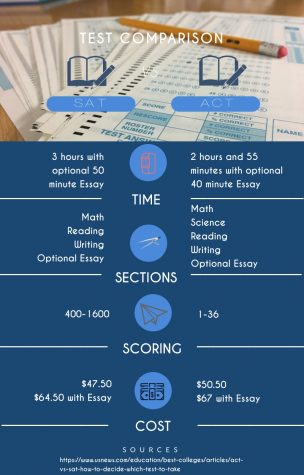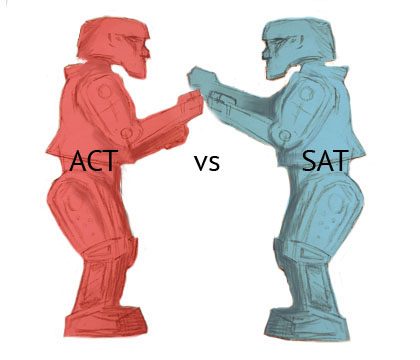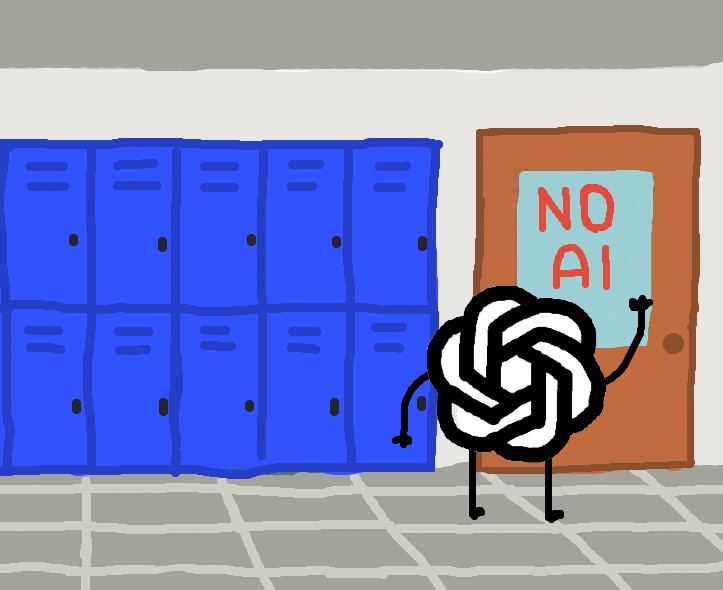Before you start panicking, seeing the words SAT and ACT in the title, know that this article is supposed to help you, not stress you out about the tests looming ominously on the horizon. For all students, the tests are inevitable, especially since AISD has (very kindly) started paying for all students to take an SAT Test during school. Test scores are a constant worry and cause of concern for all students, as we juggle schoolwork and extracurricular and getting enough sleep at night, on top of trying desperately to improve our test scores so we can get into college and move on with the rest of our lives. But, though you don’t really have an option not to take the test, you do have options about which test to take: ACT or SAT. Both of the tests claim to measure college readiness, and both are used to determine college admissions. Both of the tests have a reading, writing and math section and offer an additional essay along with the rest of the test, but after that, there are important differences. Both tests have their perks, and both tests have their downfalls. And though everyone has a preference, you have to find which test works best for you.
The SAT is the classic standardized test, and it’s almost 100 years old. It made its debut in 1926, though by a different name with different scoring, and has since been changed many times, adapting to the changes in the world. The SAT is run by The College Board, a major conglomerate, which runs a college search system, along with running both the AP and SAT tests. College Board is a non-profit organization but also is a major player in all standardized testing, which rakes in yearly revenue exceeding $750 million. The ACT tests, however, aren’t associated at all with The College Board, and therefore are a completely different entity. The ACT is run by a non-profit organization, and tests reading, writing, math and also, unlike the SAT, science.
I took my first SAT in December of last year. I did minimal prep, meaning all I did to prepare was work through a couple math sections in my SAT Test book. So, I went in with a mentality that I would just take the test to see how it worked, and to get a base score that I could work off of in the future. It went as well as expected, and I did OK, but it left me with a good idea of what I had to do to improve. I took my second SAT in April of this year, during the school-day SAT. This time I prepared, practicing for about eight hours on Khan Academy, practicing math concepts I hadn’t looked at for years. I felt pretty prepared, and went in with a good mindset. I managed to raise my score exactly 100 points; all the test prep ultimately paid off.
This summer, in a last-ditch attempt to get a better test score, I signed up for the ACT. One of my friends had taken both the SAT and ACT, and had done much, much better on the ACT, getting almost a perfect score, so I decided I might as well take it, seeing if I could do any better on a different test. I practiced a bit, answering a lot of English questions, so I could hopefully boost my reading and writing scores so that even if I didn’t do well on the math and science, I could still get a good score.
I did about 50 points better on my ACT (after the scores are converted) than my best SAT score. I even took my ACT over the summer, when I was out of practice with analytical thinking and hadn’t been using my brain very much. So personally, I think the ACT is a better test, and that it’s less difficult to get a higher score on it.

Whenever I took the SAT, I felt like they were trying to trip you up, trying to make you choose the wrong answer. Through the entire test I was second-guessing myself, going between two answers that both seemed equally correct. In part, that’s probably true. The College Board needs to make money off the SAT, and having people retake the tests to get a better score is a good way to increase profits. But I didn’t feel like that on the ACT; it felt so much more straightforward.
The ACT also tests more than just test-taking ability and its questions are pretty basic, though still challenging. The addition of science also allows students with different strengths to excel on the test. The ACT is a better way of measuring all-around knowledge, unlike the SAT, which mostly just measures if you know how to take a test.
The ACT also offers better testing accommodations to those who need them. I didn’t, but I know people who did, and the ACT was much more generous with the accommodations then the SAT was, and was also much more open in allowing people these accommodations. My friend had to fight tooth and nail to get any extra time on the SAT, while on the ACT they made sure to give her the extra time she needed.
Overall, it feels like the SAT is trying to mess you up, trying to make you fail. The ACT doesn’t feel like that, though it’s still a challenging test in its own right. This ultimately makes sense because of The College Board’s financial involvement, as they reinvest the money you pay into improving College Board, but it does not seem fair. Most colleges will accept the ACT test instead of the SAT, meaning most students have a choice in the matter.
I would recommend that everyone try both tests if they are able and work out which one is best for them. I have many friends who never even took the ACT, and excelled on the SAT despite the tricky question wording. But ultimately, it matters which one works for you, and it’s going to be different for everyone. For me, however, the ACT was the way to go.









Lily Wilson • Oct 8, 2019 at 9:53 am
I really liked this article, it was interesting to read because I’ve been wondering about the ACT and what it’s like. I’m taking the SAT this year and have been to study classes for it, my teacher only mentioned the ACT very briefly so I never really knew the difference between the two, and I was immediately drawn to the article. It’s realistic and relevant, the author writes about her own experiences, hearing about the tests from another student who’s been through it was reassuring. The article was very helpful, and the although the author made her opinion on the two tests clear, she included equal information about both.
Zada Cook • Oct 1, 2019 at 10:25 am
I really enjoyed this article. The whole reason I clicked on it in the first place was because of my sister. She’s a senior at Austin High and just recently took her ACT. I saw how stressed she got while preparing for which test to take, how to prepare, what to know, ect. This article was super informative and touched on all of that stuff. I know that kids like her are in need of this kind of information when applying to colleges and taking tests for them. I liked how the article touched on both tests. Another thing I enjoyed was how the writer included their own experience with the tests, it made the article feel a lot more personal. The writer’s opinion was voiced clearly and the article was well written.